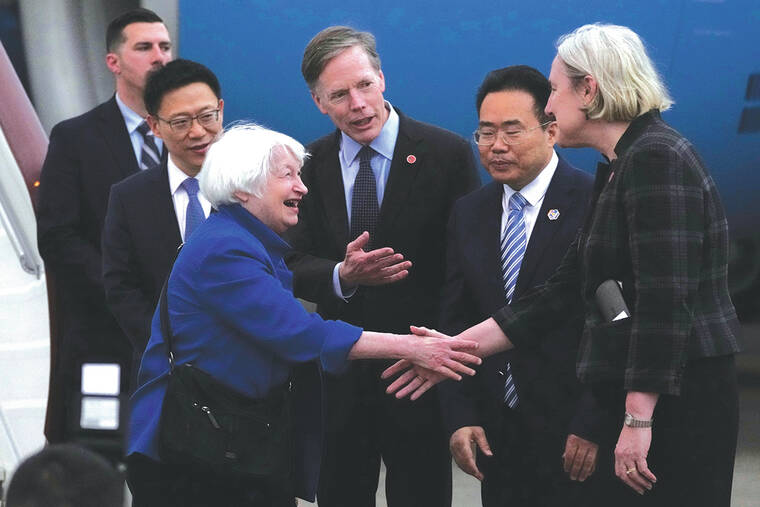US treasury secretary is in China to talk trade, anti-money laundering and Chinese ‘overproduction’
GUANGZHOU, China — Treasury Secretary Janet Yellen arrived in China on Thursday for five days of meetings in a nation determined to avoid open conflict with the United States, yet the world’s two largest economies still appear to be hashing out the rules on how to compete against each other.
There are tensions over Chinese government support for the manufacturing of electric vehicles and solar panels, just as the U.S. government ramps up its own aid for those tech sectors. There are differences in trade, ownership of TikTok, access to computer chips and national security — all of them a risk to what has become a carefully managed relationship.
The 77-year-old Yellen, a renowned economist and former Federal Reserve chair, laid out to reporters the issues that she intends to raise with her Chinese counterparts during her five-day visit. Yellen begins her trip in Guangzhou and later moves to Beijing for meetings with finance leaders and state officials. Her engagements will include Vice Premier He Lifeng, Chinese Central Bank Governor Pan Gongsheng, former Vice Premier Liu He, leaders of American businesses operating in China, university students and local leaders.
Yellen, speaking to reporters Wednesday during a refueling stop in Alaska en route to Asia, said her visit would be a “continuation of the dialogue that we have been engaged and deepening” ever since U.S. President Joe Biden and Chinese President Xi Jinping met in 2022 in Indonesia. She noted that it would be her third meeting with China’s vice premier.
Yellen recently accused China of flooding global markets with heavily subsidized green energy products, possibly undercutting the subsidies the U.S. has provided to its own renewable energy and EV sector with funds provided by the Democrats’ Inflation Reduction Act. She said she intends to repeat her concerns to Chinese officials that they’re flooding the global market with cheap solar panels and EVs that thwart the ability of other countries to develop those sectors.
“We need to have a level playing field,” Yellen told reporters. “We’re concerned about a massive investment in China in a set of industries that’s resulting in overcapacity.”
Yellen didn’t rule out taking additional steps to counter Chinese subsidies in the green energy sectors, adding, “It’s not just the United States but quite a few countries, including Mexico, Europe, Japan, that are feeling the pressure from massive investment, in these industries in China.”
The Treasury secretary’s travels come after Biden and Xi held their first call in five months on Tuesday, meant to demonstrate a return to regular leader-to-leader dialogue between the two powers. The leaders discussed Taiwan, artificial intelligence and security issues.
The call, described by the White House as “candid and constructive,” was the leaders’ first conversation since their November summit in California, which renewed ties between the two nations’ militaries and enhanced cooperation on stemming the flow of deadly fentanyl and its precursors from China.
Still, it appears to be difficult for the two countries to strike a balance between competition and antagonism.
For instance, Xi last week hosted American CEOs in Beijing to court them on investing in China. Meanwhile, Biden last August issued an executive order that instructed an inter-agency committee, chaired by Yellen, to closely monitor U.S. investment in China related to high-tech manufacturing.
Jude Blanchette, a China expert at the Center for Strategic &International Studies, said, “the Biden administration’s efforts over the last year to stabilize the relationship are clearly working, but the main friction points all remain unresolved and will likely challenge the relationship for the foreseeable future.”
“For the time being, a ‘managed rivalry’ might be the best we can hope for, given the potentially catastrophic consequences of the relationship really going off the rails,” he said.
Yellen last week said China is flooding the market with green energy that “distorts global prices,” and plans to tell her counterparts that Beijing’s increased production of solar energy, electric vehicles and lithium-ion batteries poses risks to growth to the global economy.


